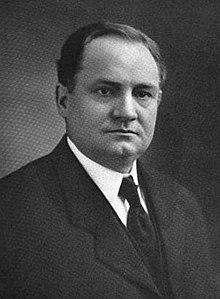Charles E. Pickett
Charles Edgar Pickett | |
|---|---|
 From Volume II (1915) of History of Black Hawk County, Iowa, and Its People | |
| Member of the U.S. House of Representatives from Iowa's 3rd district | |
| In office March 4, 1909 – March 3, 1913 | |
| Preceded by | Benjamin P. Birdsall |
| Succeeded by | Maurice Connolly |
| Personal details | |
| Born | January 14, 1866 Bonaparte, Iowa, U.S. |
| Died | July 20, 1930 (aged 64) Waterloo, Iowa, U.S. |
| Resting place | Elmwood Cemetery, Waterloo, Iowa, U.S. |
| Political party | Republican |
| Alma mater | University of Iowa College of Law |
Charles Edgar Pickett (January 14, 1866 – July 20, 1930) was a two-term Republican U.S. Representative from Iowa's 3rd congressional district.
Early years
Born near Bonaparte, Iowa, Pickett attended the common schools. He graduated from the University of Iowa at Iowa City in 1888 and from its College of Law in 1890. Pickett was admitted to the bar in 1890 and commenced practice in Waterloo, Iowa. He served as vice president of the Pioneer National Bank, and went on to serve as regent of the University of Iowa from 1896 to 1909.
He served as chairman of the Republican State Convention in 1899.
Political career
In 1908, Pickett was elected as a Republican to represent Iowa's 3rd congressional district the Sixty-first Congress. Two years later he was re-elected, leading to service in the Sixty-second Congress.
In 1912, when Republicans were divided between their own party's candidates and candidates of the Bull Moose Party, Pickett ran for re-election to a third term, but was defeated by Democrat Maurice Connolly of Dubuque. In all, he served from March 4, 1909 to March 3, 1913.
After losing the election, he resumed the practice of law in Waterloo. He again served as chairman of the Republican State Convention in 1916, and served as delegate at large to the 1920 Republican National Convention.
In 1922, U.S. Senator William S. Kenyon of Iowa resigned to accept a judgeship, forcing a special election. Pickett was one of six Republicans who ran in the Republican primary for Kenyon's former senate seat. Insurgent Smith W. Brookhart finished far ahead of Pickett and the others, by a great enough margin to avoid a convention fight.[1]
Pickett died in Waterloo, on July 20, 1930. He was interred in Elmwood Cemetery in Waterloo.
References
- ^ "Brookhart Given 41.1 Percent on All Primary Ballots," Waterloo Evening Courier, 1922-06-07 at 1.
- United States Congress. "Charles E. Pickett (id: P000325)". Biographical Directory of the United States Congress.
![]() This article incorporates public domain material from the Biographical Directory of the United States Congress
This article incorporates public domain material from the Biographical Directory of the United States Congress


